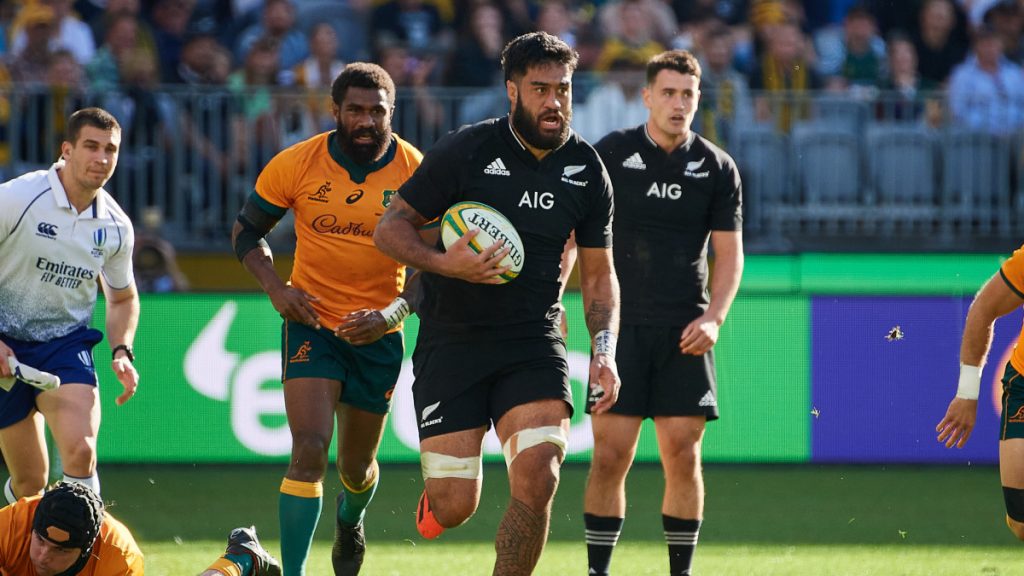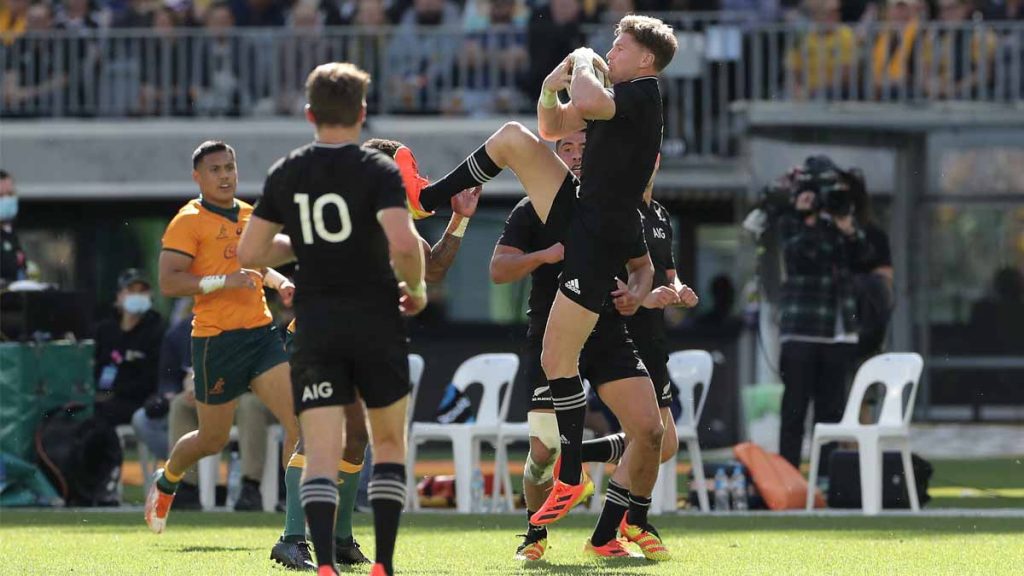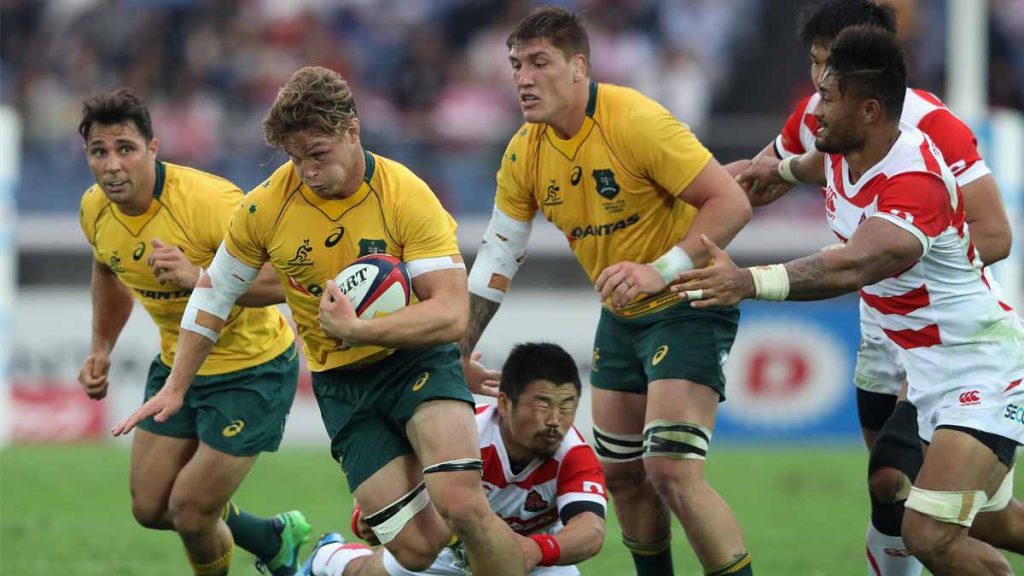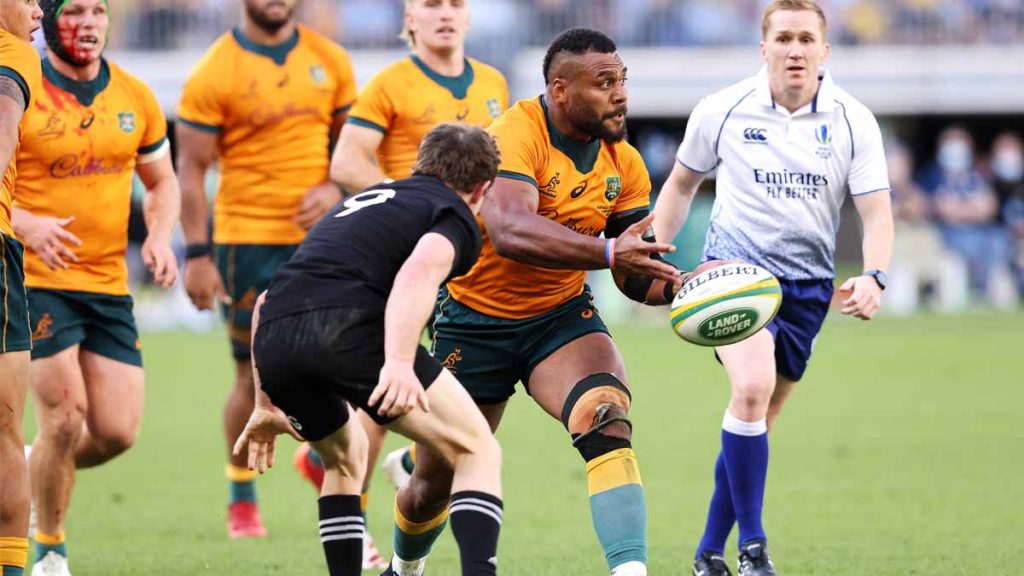It’s hard to shake the feeling that despite playing 12 tests under Dave Rennie, we still don’t really know how to measure the standing of the current Wallabies team.
Just three times in those 12 fixtures have the Wallabies tasted success, courtesy of a solitary win over the All Blacks in Queensland last year, plus the victories that paved the way for a series victory over France in July.
If Rennie were to call time on his tenure now, he would finish with the worst success rate of any Wallabies coach of the modern era.
Of course, Rennie won’t be hanging in the towel just yet – and Rugby Australia would be mad to cut ties with the man who coached the Chiefs to back-to-back Super Rugby titles in 2012 and 2013.
Because although his record leaves much to be desired, he’s also been tasked with playing the All Blacks seven times over the 12 months.

Like the Wallabies, it’s difficult to gauge where the New Zealand national side stands at this point in time, given the opposition they’ve faced since the 2019 World Cup and how eclectically they’ve performed.
Last year, they suffered an historic loss to Argentina. A week earlier, they had been narrowly defeated by the Wallabies. That fortnight marked the first time the mighty All Blacks had suffered back-to-back defeats in a decade.
But, within the same season, they also recorded their biggest-ever win over the Wallabies, and scored their second-biggest win over the Pumas since 2001.
It was, in many ways, a year to forget for all three Tri-Nations competitors. Plenty will have been taken away by each nation’s respective coaches about individual players but given the disruption the season faced as a whole, it was hard to assess the overall strength of each national team.
One year on, and the All Blacks have clearly progressed – but what about the Wallabies?
I feel like the score line the last couple of weeks hasn’t been a fair indication of where the game’s at, but that’s just the way it is.
Dave Rennie on the current standing of the Wallabies
France travelled to Australia without many of their first-choice players and while it’s fair to suggest that the All Blacks or Springboks would’ve swept Les Bleus aside without ever reaching top-gear, the Wallabies well and truly struggled to put the tourists away.
While the Wallabies were never likely to taste success playing in back-to-back matches against the All Blacks at Eden Park last month, many assumed they would put up a considerably stronger fight in Perth, where they thumped the visitors 47-26 in a record-breaking performance ahead of the last World Cup.
As had been in the case in Perth two years earlier, a Barrett brother was sent from the field in Sunday’s match but unlike in 2019, that did little to spurn the Wallabies on.
The Wallabies’ first points in the 21-38 loss didn’t come until the 49th minute, when the All Blacks had already built a 23-0 lead. Even if New Zealand hadn’t scored any further points throughout the match from that moment on, they still would have escaped with a two-point win.

Still, Rennie was adamant after the match that the Wallabies were taking steps in the right direction.
“It’s easy to look at the score line, isn’t it?” he remarked after the game. “I feel like the score line the last couple of weeks hasn’t been a fair indication of where the game’s at, but that’s just the way it is.
“We’ve had seven tests against the All Blacks. I think it’s great for us. We’re learning quickly.
“We’ve got the world champions coming out for a couple of tests. That’s going to be great for us as well.
“We’ve got to be better no doubt. But I still feel we are trending in the right direction.”
Rennie has repeatedly affirmed, however, that playing against the best is the only way that the Wallabies will raise their game to the levels that their fanbase expects from them, which means the team should have made huge leaps over the past year.
The proof, of course, will be in the pudding.
Undoubtedly, if any head coach of any national side was forced to play the All Blacks seven times in their first 12 tests, they too would possess an undesirable record.
Rennie has repeatedly affirmed, however, that playing against the best is the only way that the Wallabies will raise their game to the levels that their fanbase expects from them, which means the team should have made huge leaps over the past year.
While the schedule ahead isn’t necessarily easy-going, it’s certainly more manageable than what the Wallabies have endured over their last dozen matches.
After playing four matches against South Africa and Argentina, Australia will set out on a trip to play Japan, Scotland, England and Wales.

Rennie will likely be targeting six wins from those eight games, but the coming two matches against the Springboks could really define the season.
The high-flying world champions have a dismal record in Australia, scoring just one win over the Wallabies in the past 10 years and three since the turn of the century.
They may be coming off a World Cup title and a series victory over the Lions, but even in 2009, when South Africa managed to go undefeated against New Zealand in three matches and Morne Steyn was at the peak of his power, the Springboks could only muster a 7-point win in Perth before going down 21-6 in Brisbane.
Three years ago, the Springboks were in dire straits. They’ve since managed to turn things around, with their major crowning achievement naturally being the World Cup title in Japan in 2019. Despite their place at the top of the rankings and all their other achievements, however, the Springboks have yet to have their ability to keep pace in a high-speed game tested.
As Finn Russell’s injection into the Lions in the third test showed, a little bit of creativity and agility can cause problems for the Springboks, and Rennie and his fellow coaches will be aiming to tire South Africa out and push their big men to their aerobic limit.
In some ways, the Wallabies play a very similar attacking-oriented style to the All Blacks – they’re just not quite as good at it.
As Finn Russell’s injection into the Lions in the third test showed, a little bit of creativity and agility can cause problems for the Springboks, and Rennie and his fellow coaches will be aiming to tire South Africa out and push their big men to their aerobic limit.
The tourists will still enter this Sunday’s match as favourites, however, and rightly so, but Rennie’s Wallabies need to start delivering on their potential.
First and foremost, that starts at the selection table.
Three players, Michael Hooper, Noah Lolesio and Tom Banks, have started all six tests this year.
Hooper continues to be the best player in Australia and more than warrants his position as both openside flanker and captain.

21-year-old Lolesio has struggled with the intensity in the Bledisloe Cup matches to date and although he’s picking up valuable experience as a game-driver, the Wallabies desperately need a travelled option to take the reins at No 10 and give Lolesio a break from the action.
That could come in the form of James O’Connor, who’s only now returning from a frustrating injury that’s prevented him from playing test rugby this year, or Quade Cooper could be entrusted to run the show.
Reece Hodge also looked strong in his cameo at flyhalf last weekend and could be an option in a match that won’t necessarily be as fast-paced as the Wallabies’ three most recent matches.
Hodge is also an option to replace Banks at fullback, who’s had ample opportunities at No 15 but has yet to really look a test-level player.
Samu Kerevi’s return against the All Blacks brought some much-needed experience in the midfield and could again partner Len Ikitau – although Hunter Paisami could also be back in the mix.
Five tests on the trot is no easy task and there’s likely to be some form of rotation every week. It’s not ideal for building cohesion but, given there are still question marks over a number of positions, it does loom as a chance for Rennie to continue to test his troops.
In the forwards, props James Slipper and Allan Alaalatoa will get a huge workout from the Springboks pack but are perhaps still the better starting options, while the Wallabies have continued to struggle in the hooker department.
Brandon Paenga-Amosa has at five starts in the No 2 jersey this year and could reclaim his spot from Folau Fainga’a – but neither has nailed their chances to date.
The locking department still perhaps lacks the big, mobile bodies needed to really compete with the Springboks or All Blacks, but Rennie has ample loose forwards at his disposal who can front-up against the largest men. The big question will be who starts at number 8, with Rob Valetini, Harry Wilson and Isi Naisarani sharing the load this year.
Five tests on the trot is no easy task and there’s likely to be some form of rotation every week. It’s not ideal for building cohesion but, given there are still question marks over a number of positions, it does loom as a chance for Rennie to continue to test his troops.
It would be unfair to call Dave Rennie’s initial 18 months as Wallabies coach a failure, given the challenges the team has faced in that period, but promise needs to start being converted into on-field performance, and this weekend’s clash with the Springboks marks the perfect opportunity for the Wallabies to show they’re more than just cannon fodder for the All Blacks.


Comments
Join free and tell us what you really think!
Sign up for free